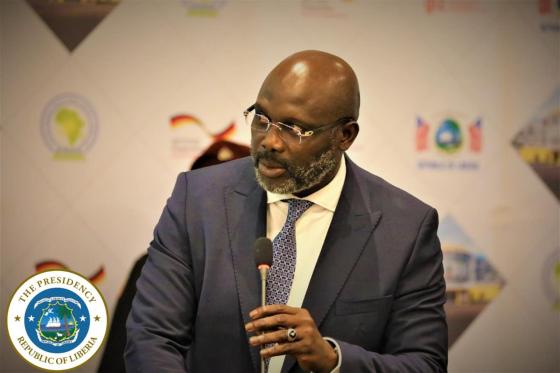Liberia's Weah Has Failed To Deliver

President Weah
.... Weah has another woeful legacy. Liberia’s social fabric became threadbare under his watch. At no time in our history have we seen one region of the country's dominance of the three branches of government. Though Liberians have always held themselves in mutual suspicion, Weah did nothing to address these fault lines.
George Weah earned the nickname “Country Giant” during the 2017 presidential election, but his lackadaisical approach to reform as Liberia’s president while dancing buga has also earned him the nickname “Buga Dancer.”
He mismanaged the economy, failed to tackle corruption, and has been unable to revise the health, educational, agriculture, and security sectors as well as build sustainable infrastructures within the country.
Government corruption – in the form of bribery, waste, and siphoning off contracts is rampant in Africa's oldest independent country. According to the Transparency International Corruption Perceptions Index 2021, Liberia ranked 136 out of 180 countries. On August 15, 2022, the U.S. The Department of the Treasury’s Office of Foreign Assets Control (OFAC) designated Weah top officials Nathaniel McGill, Sayma Syrenius Cephus, and Bill Twehway for their involvement in ongoing public corruption in Liberia.
To be fair to George Weah, Ellen Johnson Sirleaf bequeathed him an economy in a tailspin. And of course, Weah promised he was going to fix it. To be fair to Ellen Johnson too, she reportedly left $160 million in external reserves; contrary to frequent claims by the Weah government that hardly anything was left. Liberia’s rubber, iron ore, and export dwindled under Ellen Johnson Sirleaf. The Liberia dollar was devalued. Corruption was rife. Liberia became heavily indebted after debt cancellation or forgiveness. But Weah was meant to be a breath of fresh air
. He was meant to fight corruption and salvage what was left of the economy. Yet again, Weah would outdo his predecessor. For context, a month after George Weah took over from Ellen Johnson Sirleaf in 2018, our domestic debt stood at U$604.4 million. Weah would spend the next 4 years and 9 months increasing it to US$ 800 million. Our debt rose to US$1.8 billion (53.2%t of GDP) in 2021 under Weah. Liberia owes so much debt, but there is nothing to show for it. We are spending US$105 million of our revenue in 2022 on debt servicing in contrast to US$12.73 million in 2016.
Under Weah’s watch, the Liberian dollar continues to tank to all-time lows against the dollar. The prices of rice, sugar, flour, petrol, kerosene, and diesel, have continuously increased beyond what the average household can afford; a perfect storm for skyrocketing inflation. Talking of prices, how was your experience the last time you visited the market?
After four years and nine months in power, in what many saw as self-deluding, Weah on October 25, 2022, launched the USS$100 million Accelerated Community Development Programme (ACDP) with the promise of healing Liberians climb out of poverty, improve their living standards, live a healthier and longer life while reducing gross inequalities between rural and urban areas.
Well, unemployment currently accounts for half of the population (that’s approximately 65% of the youth demographic) and despite social investment schemes like Social Cash Transfer Program, Recovery of Economic Activity for Liberian Informal Sector Employment Project (REALIZE), Youth Empowerment Project (YEP), Temporary Employment for Community Youth (TECY) program, US$13 million National Fund Drive launched by the Weah’s administration.
It’s hard to see how these programs have served as any meaningful solution to the trifecta of poverty, unemployment, and underemployment. The country is among the world’s ten poorest countries, 51% of the population lives below the poverty line. While education is expected to last 10 years, most Liberians only complete 4.7 years of schooling.
42.5% of Liberians are without access to protected wells, nutritional programs to offset one or three children under the age of 5 who are stunted, and initiatives against malaria and gender-based violence. Under Weah, Liberians have gotten poorer, crime has multiplied, drug cartels are plowing our shores and ritual killings are now the order of the day.
Weah has another woeful legacy. Liberia’s social fabric became threadbare under his watch. At no time in our history have we seen one region of the country's dominance of the three branches of government. Though Liberians have always held themselves in mutual suspicion, Weah did nothing to address these fault lines.
Matter of fact, he doubled down on these suspicions when he appointed 67-year-old Associate Justice Sie-A-Nyene Gaypay Yuoh Chief Justice of the Supreme Court from his region of southeast. . Currently, southeasterners are heading the legislative, executive & judiciary branches of government. It is astonishing how the same Liberians who voted for him in 2017 across all regions are now disaffected with his government today.
I could go on and on explaining how Weah failed astoundingly in health, human rights, education, infrastructure, power, etc. But to his supporters, none of that matters. It doesn’t matter how convincing cumulative evidence I present to them. They believe what they believe regardless. It’s almost like a cult to them. Their confidence in Weah will never be swayed even in the face of incontrovertible evidence. But political leaders should never be venerated to such positions, especially in a so-called constitutional democracy.
As we prepare to elect fresh leaders next year, it’s helpful to remind ourselves that the people we think are capable of doing the job may end up becoming a disappointment like Weah. If that happens, the honorable thing to do is to own up to the facts instead of being self-deluded like Weah’s supporters.
Editor’s note: The views expressed in this commentary are solely of the author and do not necessarily represent that of the Daily Observer newspaper.
